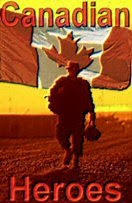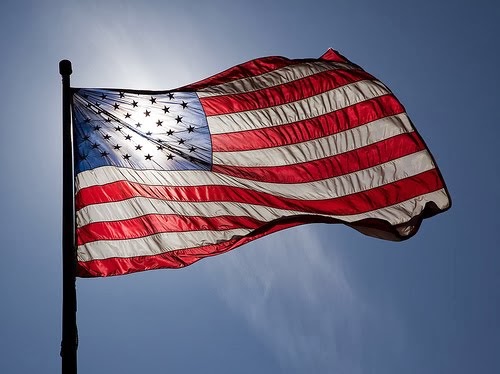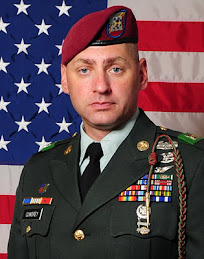
"JP was a magical man, with boundless energy and goodness," said Dr. Pryor's mentor at Penn, Dr. C. William Schwab. "He was a devoted son, husband, father, colleague and friend. . . . At his core were many great values, but his passion for service to others" stood out.In an undated document that Dr. Pryor wrote and left with family before he deployed, he recounted his early affinity for injured people, his passion to serve - specifically in wartime - and the difficulty of balancing his love of country and family, because he felt his decision to go to Iraq was not always supported by those closest to him. [Philly.com here]
From The Philadelphia Inquirer Archives
June 4, 2006
A surgeon at the Iraqi front whose soul is often wounded.
John P. Pryor
is a trauma surgeon at the Hospital of the University of Pennsylvania, as well as a major in the U.S. Army Reserve Medical Corps. He has just returned from a tour of active duty in which he was the general/trauma surgeon for the 344th Combat Support Hospital in Abu Ghraib, Iraq.
Today the warning came over the radio: "Urgent litter coming in by ground." I immediately went to the Emergency Treatment Room (ETR).
"IED, Marines," was all the nurse said as I walked in, IED meaning "improvised explosive device." The hospital staff went into full swing. These people are at the end of a yearlong deployment here. They are experienced, hardened, and cool under pressure, their activities programmed and efficient. I took my position at the head of bed number one, put my head down, and waited.
Within a few minutes, the litter team burst into the ETR. The patient's arms dangled off the stretcher with bone exposed, and I immediately knew that this was going to be a bad one. When the litter was pulled beside the bed, I saw the full extent of what I was up against. Driver, I thought to myself. Drivers always seem to get the full force. There is a pungent smell of gasoline and burned flesh.
My first order of business was to remove his body armor before we move him over; to do this, we have to sit him up to pull the arms through the sleeves. When we did, his arms, each broken in several places, flopped around like a puppet's. As we moved him over, I tried to ignore the massive destruction of his legs and focus on potential life-threatening chest and abdomen wounds. He was moaning, actually a good sign: The brain was still getting blood flow. Anesthesia moved to intubate him, as the emergency medicine physician started the primary survey. Nurses started lines, lab was there to bring blood, medics held pressure on bleeding wounds, all in a dance that has been repeated so many times before.
The other patients began to file in, eventually filling the ETR. One soldier in a bed next to ours was calling out to my patient, ignoring his own gaping wounds: "You're going to be OK, man, hang in there."
I began to focus on the problem and my plan. Both legs had massive injuries. The left thigh was torn apart and burned with a tourniquet at the groin. The right leg was mangled below the knee with a tourniquet above that. There was a neck wound that wasn't bleeding and shrapnel to the face. Both arms had multiple levels of open fractures. The pulse was weak, and the blood pressure was barely readable.
We hung blood immediately. The chest X-ray did not show any thoracic injury. We shot an abdominal film to look for shrapnel that may have gone into the belly - none. As we moved to the operating room, the hospital commander stopped me to ask if this patient was going to make it. I told him I was worried that once we started to resuscitate him, the bleeding would become even worse; I didn't know whether he would make it. His head dropped as he walked back to the chaos of the ETR.
In the operating room, we started by getting control of the external bleeding of the legs. Blood was coming from everywhere: bright-red arterial blood, dark-blue venous blood, and swirls of the two together in pools between the flesh.
Two orthopedic surgeons and I worked frantically to get control of the bleeding, which, as predicted, became worse as we started to resuscitate him. Anesthesia was struggling to keep a blood pressure, infusing unit after unit of packed red blood cells and plasma. I was going deeper and deeper into the groin to track down the source of the bleeding. Suddenly, my hand broke into a space, and a gush of blood came out. I realized I was in the retroperitoneal space; the bleeding was coming from there. This was the worst-case scenario. Bleeding from this location is the toughest in the body to control. Bleeding from this area is almost always from large veins that cannot be controlled with sutures or arterial control.
We opened the abdominal cavity and clamped the arteries that feed the pelvis, but it didn't help. We packed as tight as we could, and then put a sheet around the pelvis to pull the bones together in an attempt to tamponade the bleeding, but it was not enough. His heart went into a lethal arrhythmia. We shocked him and pumped epinephrine into his bloodstream. After a few minutes, his heart stopped for the last time.
There was an immediate silence in the operating room as soon as I announced the time of death. Most of the staff had tears running down their faces; this was a long year for them, with so many of these kids dying in this room. I could not move for several minutes. I looked at this kid, a child, and I apologized to him for not being skillful enough to save him.
As a trauma surgeon, every death I have is painful; every one takes a little out of me. Losing these kids here in Iraq rips a hole through my soul so large that it's hard for me to continue breathing. After a few minutes, I collected myself and began to direct the care for his final journey home. We closed what we could of the wounds and wrapped the ones we couldn't get together. We washed all of the dirt and oil off his skin, combed his hair and washed his face. He was transferred to a litter and brought to a private, enclosed room where we placed him inside a heavy black body bag. The body was draped with the American flag, and a guard was posted. The chaplain gathered some of the providers, and we said prayers over the body.
There was, and always is, a palpable grief that comes over the entire staff when we lose an American solider. Everyone is affected, and everyone deals with it in a different way. For me, this is not an objective, depressing thing to be a part of; it is very, very personal. I was the surgeon who couldn't save him. For me the grief is intolerable. I become the focus of the mourning, for the staff people come and give me a hug. They ask me if I am OK; they pray for me. I appreciate it and hate it at the same time.
Often my misery turns into anger. Sometimes I become angry with God for allowing this to happen. I just want the whole thing to be over, and all of these kids to go home to their families and live long lives. I have seen so many soldiers and Marines die here; I just want it all to end.
We arrange for his buddies to come in and say goodbye, something I cannot even bear to watch. After a time of reflection, the unit gathers the equipment and prepares to go out again that night. Courage: to lose a friend in battle and go right back into the fight. I love every single one of them.
The body was eventually taken to the loading zone and loaded into a helicopter with some of his buddies as escorts. He is taken to Baghdad International Airport (BIAP), where mortuary affairs prepared the body for transport home. When the casket is brought onto the airstrip, all personnel stop what they are doing and attend a 45-minute ceremony on the airstrip. They tell me that this happens two to three times a day, but everyone takes time out to attend the ceremonies. An honor guard then brings the flag-draped casket onto the C-130 with full military honors.
In Kuwait, the casket is removed first, again with a full honor guard. The Marine will be brought to Dover Air Force Base in Delaware and eventually home and to his final resting place.
If I could say something to this Marine's parents, it would be this: I am so sorry that you have lost your son. We, more than almost everyone else, know he was a true American hero. I want you to know that the Marines, medics, doctors and nurses of the 344th Combat Support Hospital did everything possible to save him. I want you to know I personally did everything I could, and that I am sorry that it wasn't enough. Although we never knew your son, we loved him. I want you to know that although he lost his life, we preserved his dignity after death. We held his hand when he died and prayed for his soul and for God to give you strength. I want you to know that he had great friends who cared deeply for him, and that they were also here when he died. He was never alone for his journey back to you. I also want you to know that I will never forget your son, and that I will pray for him and all of the children lost in this war.
Dr. John Pryor was killed Thursday, Christmas Day, by a mortar attack, in Iraq. This was his second deployment. He is most beloved by many in the medical community here in Philadelphia.
If you go to the link below, there is a link to his obituary and a place to sign a memorial guest book.
www.philly.com/
And, if you go to the Washington Post, you will find something that Dr. Pryor wrote about his work in West Philadelphia:
The War in West Philadelphia
By John P. PryorSunday, August 5, 2007; Page B07
I didn't hear the cars screech to a halt, but one of the trauma nurses did. He ran outside with two emergency department medics to find several people in a car, all of their clothes soaked with blood. The passengers were screaming for someone to help the young man in the front seat, who was unresponsive. The team threw the limp victim onto a gurney, one of several that stand waiting for these types of scenarios, which occur almost nightly at our trauma center....
The nursing staff rolled the dead man's body into a bed and readied the stall for the fourth patient, who had three gunshot wounds to his right arm and two to his left. With the emergency medicine physicians, surgery residents and medics working on the two critical patients, I assigned the fourth patient to a capable medical student who courageously accepted the battlefield promotion to intern.In the swirl of screams and moving figures, my mind drifted to my recent experience in Iraq as an Army surgeon. There we dealt regularly with "mascals," or mass-casualty situations. In Iraq, ironically, I found myself drawing on my experience as a civilian trauma surgeon each time mascals would overrun the combat hospital. As nine or 10 patients from a firefight rolled in, I sometimes caught myself saying "just like another Friday night in West Philadelphia."
The wounds and nationalities of the patients are different, but the feelings of helplessness, despair and loss are the same. In Iraq, soldiers die for freedom, for honor, for their country and for their buddies. Here in Philadelphia, they die without honor, without purpose, for no country, for no one.
More young men are killed each day on the streets of America than on the worst days of carnage and loss in Iraq. There is a war at home raging every day, filling our trauma centers with so many wounded children that it sometimes makes Baghdad seem like a quiet city in Iowa.
Unlike the Iraq conflict, this war is not on the front pages of The Post or on CNN. You have heard of the Washington area sniper shootings and the massacre at Virginia Tech. I am sure you have not heard about the "Lex Street massacre," in which 10 people ages 15 to 56 were lined up and shot, execution-style, in the winter of 2000. Seven were killed, three critically injured.
You haven't heard about this tragedy because it happened to inner-city poor people in a crack house in Philadelphia. Imagine, for a moment, if this had occurred in a suburban shopping mall or if a Marine unit in Iraq had been involved. There would be shock, outrage, 24-hour news coverage, Senate hearings and a new color of ribbon to wear. That double standard, that triage of compassion and empathy, is why the war on the streets continues unabated.
I am on call Wednesday night. The statistics indicate that then I will once again walk with the chaplain to a small room off the emergency room. I will open a heavy brown door and make eye contact with a room full of people; a mother, perhaps a father or a grandmother. They will look at me with tears welling up, their knees weak, and lean forward while watching my lips, bracing for news about their loved one. I will remain standing and reach out to hold the mother's hand. My announcement will be short and firm, the intonation polished from years of practice. The words will be simple for me to say, but sharp as a sword for them to hear; "I am sorry, your son has died."
The writer directs the trauma program at the Hospital of the University of Pennsylvania in Philadelphia. He served at a combat hospital in Abu Ghraib from February to June 2006. [read the rest here]
 (DAVID M WARREN / Staff Photographer)John P. Pryor at work in the Hospital of the University of Pennsylvania trauma center last year. He died from enemy fire on Christmas in Iraq.
(DAVID M WARREN / Staff Photographer)John P. Pryor at work in the Hospital of the University of Pennsylvania trauma center last year. He died from enemy fire on Christmas in Iraq.
John P. Pryor, 42, surgeon and soldier John P. Pryor, 42, of Moorestown, the dedicated leader of the University of Pennsylvania's trauma team and a decorated major in the Army Reserve who wrote eloquently about the painful parallels between battlefield deaths and urban homicides, was killed on Christmas by enemy fire in Iraq while serving as a combat surgeon. [Philly.com]John P. Pryor, 42, surgeon and soldier
John P. Pryor, 42, of Moorestown, the dedicated leader of the University of Pennsylvania's trauma team and a decorated major in the Army Reserve who wrote eloquently about the painful parallels between battlefield deaths and urban homicides, was killed on Christmas by enemy fire in Iraq while serving as a combat surgeon.
Dr. Pryor deployed Dec. 6 and was with a risky frontline surgical unit when he was killed by shrapnel from a mortar round. It was his second tour of duty in Iraq.
Dr. Pryor, who was experienced and cool under pressure, was born in Mount Vernon, N.Y., and raised near Albany. He completed surgical training at the State University of New York in Buffalo, and came to the Hospital of the University of Pennsylvania in 1999. After a fellowship in trauma surgery and critical care, he joined Penn's surgical faculty and served as director of the hospital's nationally recognized trauma program....
...said Dr. Pryor's mentor at Penn, Dr. C. William Schwab. "He was a devoted son, husband, father, colleague and friend. . . . At his core were many great values, but his passion for service to others" stood out...
"He was a brilliant guy, but he didn't intimidate people when he spoke to them about these issues," said Red Cross chief executive officer Tom Foley. "It's a cliche to say, 'Every man's death diminishes me,' but his death diminishes us more than a little, because he was doing things on so many fronts while also raising a family."
A talented writer, Dr. Pryor contributed opinion articles to The Inquirer and the Washington Post, and often was interviewed by NPR and ABC News.
"In Iraq, ironically, I found myself drawing on my experience as a civilian trauma surgeon each time 'mascals,' or 'mass casualty situations,' would overrun the combat hospital," he told NPR last year. "As nine or 10 patients from a firefight rolled in, I sometimes caught myself saying, 'Just like another Friday night in West Philadelphia.'"
A hard worker who drove himself relentlessly, Dr. Pryor took it personally when he was unable to save someone on his operating table.
In a 2006 Inquirer opinion piece describing his service with the 344th Combat Support Hospital in Abu Ghraib, Dr. Pryor wrote of the "palpable grief" that comes over the staff when a U.S. soldier doesn't survive.
"Everyone is affected and everyone deals with it in a different way. For me," he wrote, "it is very, very personal. I was the surgeon who couldn't save him. . . . The staff people come and give me a hug. They ask me if I am OK; they pray for me. I appreciate it, and I hate it at the same time."
Dr. Pryor is survived by his wife, Carmela V. Calvo, a pediatrician at St. Christopher's Hospital for Children; a daughter, Danielle; sons Francis and John Jr.; a brother; and his parents, Richard C. and Victoria.
Friends said a favorite quote from Albert Schweitzer that hung on Dr. Pryor's Penn office wall captured his spirit.
"Seek always to do some good, somewhere," it reads. "Even if it's a little thing, do something for those who need help, something for which you get no pay but the privilege of doing it. For remember, you don't live in a world all your own. Your brothers are here, too." [here]
Let us NEVER forget. Rest in peace, Major. Rest in peace.
[sources: here, here, here, and here]
[source: CBS here]
H/T Kathy at Soldiers' Angels













3 comments:
Wow. Thanks Brat, for sharing this. With grateful sadness to our brave heroes.
Dr. John Pryor, rest in peace Hero. You GAVE ALL even before GOD took you home. You will never be forgotten.
Donna
Proud Army Mom
Thanks, brat, for highlighting this amazing and inspiring man.
We can never ever be too grateful for these men and women this country is blessed with.
Post a Comment